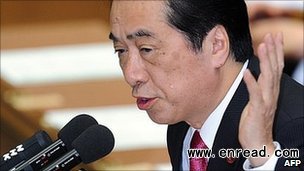| ||||||||||||||||||||||||||||||||||||||||||||||||||||||||
|
Japanese Prime Minister Naoto Kan has survived a no-confidence motion brought by MPs critical of his handling of the earthquake and tsunami1 disaster. 日本首相菅直人对地震和海啸的处理方式引起议会不满,议会因此对其进行不信任动议,菅直人勉强通过。  Naoto Kan faced down a rebellion by some of his own party members He was trying to head off(阻止) a rebellion by senior members of his party which could have forced him from power. March's disaster killed thousands of people and crippled the Fukushima Daiichi nuclear plant. The BBC's Roland Buerk in Tokyo says Mr Kan has secured himself a few more months in power, but he has been left a weakened figure by the rebellion in his party. When Mr Kan came to office last June, he was Japan's fifth prime minister in five years. He has already survived several attempts by his opponents to force him to step down. 'Beyond party lines' This time, senior figures in his Democratic Party of Japan (DPJ) had indicated they would support the no-confidence motion, increasing his chances of being forced out. In a last-minute attempt to rally support, he urged a meeting of DPJ politicians to reject the no-confidence motion. "I would like for the younger generation to take over various responsibilities once I fulfil certain roles that I need to, as I work on handling the disaster," he said. Former Prime Minister Yukio Hatoyama - who had previously2 said he would support the no-confidence motion - said he would support Mr Kan. The no-confidence motion was submitted by the main opposition3 Liberal Democratic Party (LDP), their smaller ally the New Komeito party and the Sunrise Party, and is expected to be backed by the Communist Party. The LDP has accused Mr Kan of mishandling the reconstruction4 and relief efforts following the tsunami, as well as the Fukushima nuclear crisis. In parliament on Wednesday, LDP leader Sadakazu Tanigaki told Mr Kan: "You have no personal virtues5 or ability to unite your own party members. I'm telling you to quit. "Once you leave, there will be many ways for us to unite, to revitalise(使新生) Japan beyond party lines." Earlier this month, Mr Kan announced that Japan will scrap6(废弃,解体) plans to increase its dependence7 on nuclear power. 点击  收听单词发音 收听单词发音
|
||||||||||||||||||||||||||||||||||||||||||||||||||||||||
上一篇:德国黄瓜种植遭大肠杆菌感染 下一篇:智利火山链爆发 数千居民撤离 |
||||||||||||||||||||||||||||||||||||||||||||||||||||||||
- 发表评论
-
- 最新评论 进入详细评论页>>



